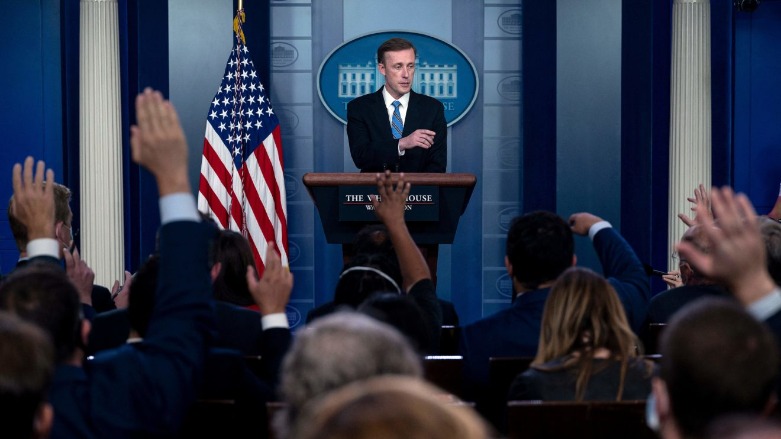White House warns Iran; finally says Iran proxies behind attacks on US troops

WASHINGTON DC (Kurdistan 24) – The White House acknowledged on Sunday that Iranian proxies were behind repeated attacks on US forces, as National Security Adviser Jake Sullivan issued a statement in response to an Iranian statement the day before, in which Tehran announced that it would impose sanctions on some 50 US officials and former officials for the assassination in Jan. 2020 of Gen. Qasim Soleimani, head of the Qods Force of Iran’s Islamic Revolutionary Guard Corps (IRGC.)
“Yesterday, Iran purported to impose sanctions on 52 Americans,” Sullivan said in a written statement, adding “they do so as Iran’s proxy militias continue to attack American troops in the Middle East.”
That statement marked the first time in recent months that senior Biden administration officials have officially held Iranian proxies responsible for attacks on US forces—although such attacks have increased markedly on the US-led Coalition forces aiding local partners in Iraq and Syria in the fight against ISIS.
Read More: Attacks on Coalition forces continue, as very limited US retaliatory strike failed at deterrence
As recently as Thursday—just three days ago—a journalist asked White House Press Secretary Jen Psaki about “an escalation recently by the pro-Iran militias in Iraq and Syria against [the] US presence.”
“We don’t have any specific attribution today, in terms of the particular group by name or groups who might be responsible for this,” Psaki responded. “We don’t have anything new on that front.”
That was so, even as an attack earlier that week on Coalition targets at the Baghdad Airport was carried out by explosive drones that had written on their wings, “Operations of the Revenge of the Commanders (or Leadership, depending on one translated the Arabic.)
Psaki’s unwillingness even to suggest that Iranian proxies were behind the attacks on Coalition targets in Iraq and Syria represented a willful denial of the obvious, perhaps driven by the talks in Vienna on restoring the 2015 Iranian nuclear deal; perhaps by what is emerging as a White House aversion to even threatening the use of force; or perhaps both.
The result was predictable: weakness in the face of aggression only invites further aggression.
Sullivan’s statement on Sunday also charged, “Iranian officials threaten to carry out terror operations inside the United States and elsewhere around the world.”
“The United States of America,” he continued, “will protect and defend its citizens,” regardless of any “disagreements on politics” or “on Iran policy,” a reference to the many Trump administration officials named by Iran on Saturday.
Why the Shift?
It is unclear what prompted the change from Thursday—when Psaki could not say which groups were behind the attacks on Coalition troops—and Sunday, when Sullivan identified Iranian proxies.
Perhaps, it is just as it seems, and Iran’s announcement of a new list of sanctioned individuals was simply the last straw. Perhaps, if the nuclear talks in Vienna were an inhibiting factor, that they have produced only limited results, has reduced that constraint.
Or, perhaps, Washington has received intelligence about an Iranian plot to murder some figure, in the US or elsewhere.
Iran has a long history of carrying out assassination plots abroad. In 2011, during the Obama administration, a dual US-Iranian citizen, Manssor Arbabsiar, was arrested in New York, charged with a plot to assassinate the Saudi ambassador to Washington.
Arbabsiar was working in concert with, and at the direction of, the IRGC’s Qods Force, US prosecutors charged. He eventually pled guilty and was sentenced to 25 years in prison.
Last summer, in July 2021—after Biden had become president—four Iranians were charged by federal prosecutors with plotting to kidnap Masih Alinejad, an Iranian-American journalist; critic of the Iranian regime; and a US citizen, living in New York. She even hosted a program—“Tablet”—on the Persian service of the Voice of America.
Iran has long targeted dissidents abroad, including Kurdish leaders. In 1989,
Dr. Abdul Rahman Ghassemlou, head of the Democratic Party of Iranian Kurdistan (PDKI), was murdered by Iranian agents in Vienna.
Three years later, Ghassemlou’s successor, Sadegh Sharafkandi, was murdered, along with three other Iranian Kurds, at a restaurant in Berlin.
More recently, in June 2018, European authorities disrupted a plot to bomb a large rally outside Paris of the National Council of Resistance of Iran. An Iranian diplomat, Assadolah Assadi, posted to Tehran’s embassy in Austria, was arrested for the plot, after he traveled to Germany, abandoning the diplomatic immunity he enjoyed in Vienna.
The NCRI charged that Assadi had been station chief for Iranian intelligence at its Vienna embassy since 2014.
Last year, a Belgium court found him guilty of attempted terrorism and sentenced him to 20 years in prison.
Most recently, in November, Iranian-backed militias tried to assassinate Iraqi Prime Minister, Mustafa al-Kadhimi, with explosive drones.
Read More: Iran-backed militia behind assassination attempt on Iraqi PM: report
However, their effort failed, and Kadhimi emerged unhurt from the attack on his residence, although some members of his security detail were injured.
The Kurdish leadership joined many others, including US President Joe Biden, in condemning the attack.
